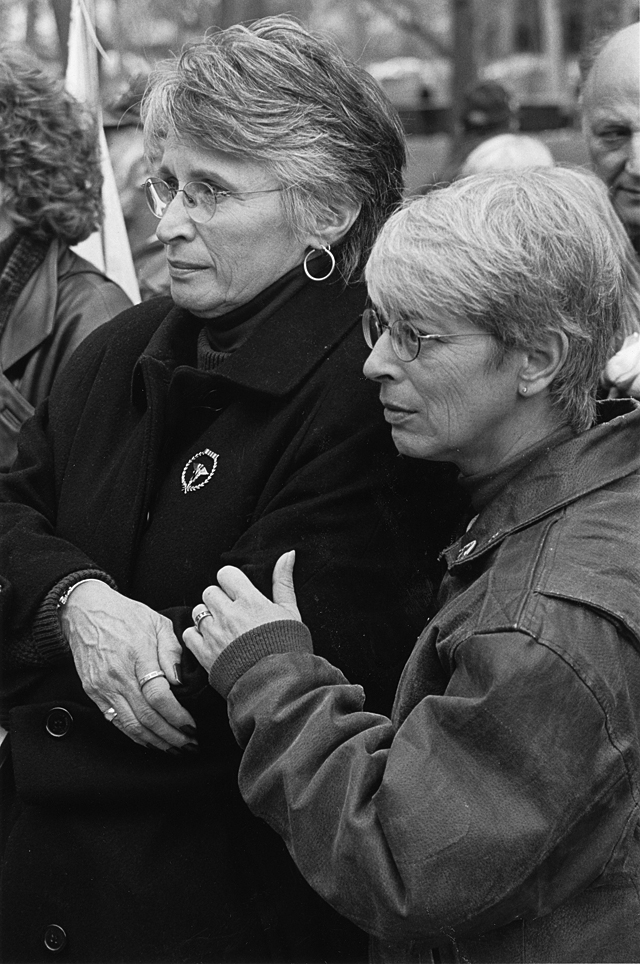 |
|||||||||||
|
Sandy Miller: Reaching Out To The Homeless BY MICHAEL KEATING
Eventually Miller landed a job at Lucent Technologies (AT&T) and there she stayed. But underneath the surface, things were changing. In 1989 she joined VVA. Several years later at a Pennsylvania State Council meeting, she met Marsha Four. “She asked if I liked camping,” Miller recalls. “I’m a country girl. I said, ‘Sure.’ The next weekend I’m driving in the dark morning through the badlands of Philadelphia to a stand down. It was the first Philadelphia Stand Down, 1995. The next year, during Stand Down 1996, Marsha turns to me and says, ‘Wouldn’t it be great if we could do this all the time?’ “I told her, ‘You’ve got to be out of your mind.’ ” The grind continued for Miller at Lucent. Then Four was hired as Director of Homeless Programs at The Philadelphia Veterans Multi-Service & Education Center. She knew there were lots of veterans working at Lucent and thought perhaps she could attract someone there to work with her homeless veterans program. She asked Miller to help distribute the job description. “I read the job description, and I said to myself, ‘I can do that,’ ” Miller says. So she faxed her own resumé to Four. Four quickly called her. “Are you out of your mind?” she demanded. Miller took the job of managing a 55-bed, mixed-gender facility for homeless veterans. It entailed three times the work at one quarter the salary. But that hardly mattered to her: “I was going crazy at Lucent.” In May 1997, six months after she had initially submitted her resignation, Sandy Miller was given the keys to the new facility that she would oversee. “I know it sounds corny and silly,” she says, “but when I turned that key in the lock, something inside me said, ‘You’re home. This is where you need to be.’” It was work—hard, demanding work with people precariously close to the edge. But every day had significance for Miller. Every day she looked forward to the labor before her. Every day had meaning. “If your heart’s not in it,” she says, “your mind can’t be.” Like most homeless programs, providing housing was only one small piece of the puzzle. She had to pursue grants and outside funding. She had to feed the residents. She had to provide a safe environment for people falling through the social safety net. Miller had to provide mental health counseling. And she had to provide the tools and knowledge to enable homeless veterans to find jobs. “We plan for discharge from the beginning,” Miller says. This is transitional—not permanent—housing; the goal is to get veterans functioning and on their own. “I’ve been working with homeless veterans for fifteen years,” says Miller. In 2010, she was promoted to Director of the Homeless Residences Program, and took on a much larger challenge. There were ninety-five beds for men, thirty for women. In addition, it was located on the campus of the Coatesville VA Medical Center. Being on the Coatesville campus had huge advantages, including easy access to medical care and mental health counseling and the availability of campus police. But being a bigger facility brought big concerns. For example: 1,800 meals per week, plus bag lunches. Seven full-time staff work in the men’s facility with eleven resident-helpers; four work for the women with six resident-helpers.
It’s tough. Years ago they called it tough love. Director Miller morphs into “Mother Superior” and sometimes into “Mom.” The rules, of necessity, are strict. “But if you need to talk,” Miller says, “come in. The door is always open.” One of the greatest pleasures of her job, she says, is getting to know the residents intimately. “I like being a ‘mom.’ I like being able to recognize someone by the sound of her voice before I even turn around.” Recently Miller suffered through three personal deaths—deaths unrelated to the homeless facility. She was touched by the outpouring of sympathy, including cards and small gifts, from the residents. Such expressions build and validate relationships, and they help build the self-esteem that is so often achingly absent in those who enter the facility. Self-esteem. Self-control. Self-reliance. Those are the goals. But everything begins with self-esteem. Miller says one of her most important functions is simply to be available, to be “someone they can be close to and can talk to but who is not judgmental. “It’s not a job,” Miller says, “it’s all I do.” In fact, she marvels at her good fortune that with her work she may have “had something to do with turning a person’s life around.” Fifteen years. That’s a long time to be in the trenches—a long time to try to tend to the formidable needs of homeless veterans. “I’m still an NCO,” she shrugs, “still taking care of my troops.”
|
|||||||||||
| |
|||||||||||
|
|||||||||||
8719 Colesville Road, Suite 100, Silver Spring. MD 20910 | www.vva.org | contact us |
|||||||||||









 After serving in the U.S. Navy from 1975-81 as a radioman, Sandy Miller thought she would find a good job in the federal government. Wrong. Instead, she went from unemployed to a variety of jobs, including keypunch operator. She even had a job helping assemble trucks.
After serving in the U.S. Navy from 1975-81 as a radioman, Sandy Miller thought she would find a good job in the federal government. Wrong. Instead, she went from unemployed to a variety of jobs, including keypunch operator. She even had a job helping assemble trucks.  Fortunately, the residents are all veterans. The facility is run in strict military fashion. There’s a chain of command. There are milestones. There are expectations. There is a zero tolerance for drugs. Same goes for alcohol: one time and you’re out. No exceptions.
Fortunately, the residents are all veterans. The facility is run in strict military fashion. There’s a chain of command. There are milestones. There are expectations. There is a zero tolerance for drugs. Same goes for alcohol: one time and you’re out. No exceptions.